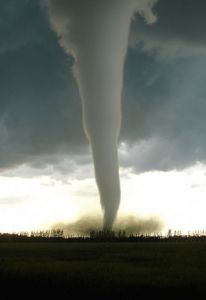[ad_1]
Contributed by Debbie Clason, staff writer, Healthy Hearing
No one expects to be involved in a disaster. Tornadoes, fires, earthquakes and home break-ins are unexpected — and unwanted. Unfortunately, they’re a fact of life. That’s why it’s always good to be prepared, especially if a loved one has hearing loss. Here are a few suggestions for helping those you love with hearing loss prepare for disasters.
Put together an emergency kit

whether you have hearing
loss or not! Try these tips
from the Red Cross.
The American Red Cross recommends every person have an emergency preparedness kit to use at home or take with you in case of an emergency. This kit should contain:
- Water: one gallon per person per day
- Food: non-perishable, easy-to-prepare items
- Flashlight
- First aid kit
- Medications (7-day supply) and medical items
- Multi-purpose tool
- Sanitation and personal hygiene items
- Copies of personal documents (medication list, medical information, proof of address, deed/lease to home, passports, birth certificates, insurance policies)
- Cell phone with car chargers
- Family and emergency contact information
- Extra cash
- Blanket
- Map of area
- Battery-powered or hand-crank radio and television. Those with hearing loss will appreciate a television with closed caption capability
- Extra batteries, for your radio and television
Additional items to put in your emergency kit for those who are deaf and hard of hearing include:
Set up communications ahead of time
When disaster strikes, chaos usually follows. Having a communication plan helps your entire family know what steps to take and how to stay calm during the emergency. Here are some additional communication tips to put in place for family members with hearing loss.
- Have a chat with everyone in the family and make sure they understand the family emergency plan. Practice your fire evacuation plan and make sure everyone knows where to meet in case you get separated regardless of the emergency.
- Sign up to receive emergency email notification of natural disasters or other emergencies in your area. Emergencyemail.org will send you free email notifications to your wireless device.
- Check with your local emergency management office to see if Reverse 911 is available in your area. This service will call you in an emergency.
- Place signs near your front and back doors to alert emergency personnel of any people in your home with hearing loss and the location of their bedrooms.
- Let your family member’s neighbors know they have hearing loss and to alert them in an emergency.
- If your family member’s neighborhood has a community Emergency Response Team (CERT), sign them up to be alerted in an emergency.
Assistive technology
Another good way to make sure you’re prepared for a natural disaster is by investing in assistive listening devices for family members who have hearing loss. These devices work in conjunction with hearing aids or are specially designed to alert those who are deaf and hard of hearing. Most of these devices are inexpensive, yet can be invaluable when disaster strikes.
Severe weather
The National Weather service (NWS) uses Specific Area Message Encoding (SAME) technology to send severe weather warnings directly into your home through a National Oceanic and Atmospheric Administration (NOAA) Weather Radio (NWR). According to the NWS, at least 97 percent of the American population is covered by NWR broadcasts and NWR SAME radio receivers can be equipped with special output connecters which activate alerting devices such as bed shakers, pillow vibrators, sirens and strobe lights.
NWR SAME receivers are sold by a variety of manufacturers, such as Radio Shack, Midland, Recom, Homesafe and First Alert. Basic receivers range in price from $50 to $90; systems packaged with external alarm devices begin at $100.
Fire
When someone you love doesn’t hear well, they probably won’t be able to hear a typical smoke alarm you buy from the local home improvement store, either. Consider installing a bit of extra protection with one of these devices. Most can be purchased at a home improvement store or online. A hearing healthcare professional should be able to recommend the best device for the severity of your loved one’s hearing loss and physical limitations:
- Smoke alarm alert devices produce a loud, mixed low-pitched sound, which is easier for individuals with hearing loss to hear. This equipment is activate by the sound of the smoke alarm and is best when installed near the bed
- Electronic strobe lights provide a visual alert to accompany a fire or carbon monoxide alarm. Separate flash patterns can be set for each type of alarm
- Fire alarm bed and pillow shakers work with existing smoke detectors by shaking the bed (or pillow) Most are portable and plug into any 110-volt electrical outlet
Please note: since many of these devices are battery operated, make a mental note to change the batteries each time you are asked to set your clocks back for daylight savings.
Theft
The only thing worse than realizing your home has been burglarized is learning your loss isn’t covered by insurance. Four burglaries occur every minute in the United States. Thirty percent of burglars enter through an unlocked door or window, 33 percent enter through the front door. And, while most are looking for jewelry, cash or electronics, it’s probably a good idea to make sure your loved one’s hearing aids are protected in case of loss.
- Check their homeowner’s insurance policy to make sure hearing aids are covered
- If your insurance policy doesn’t cover this equipment, they may be able to purchase supplemental insurance for loss, accidental damage and repair
Benjamin Franklin is quoted as saying “An ounce of prevention is worth a pound of cure.” Taking a few minutes to prepare for disasters will give you peace of mind if nothing happens — and a better chance to survive when an unexpected emergency occurs.
[ad_2]
Source link

